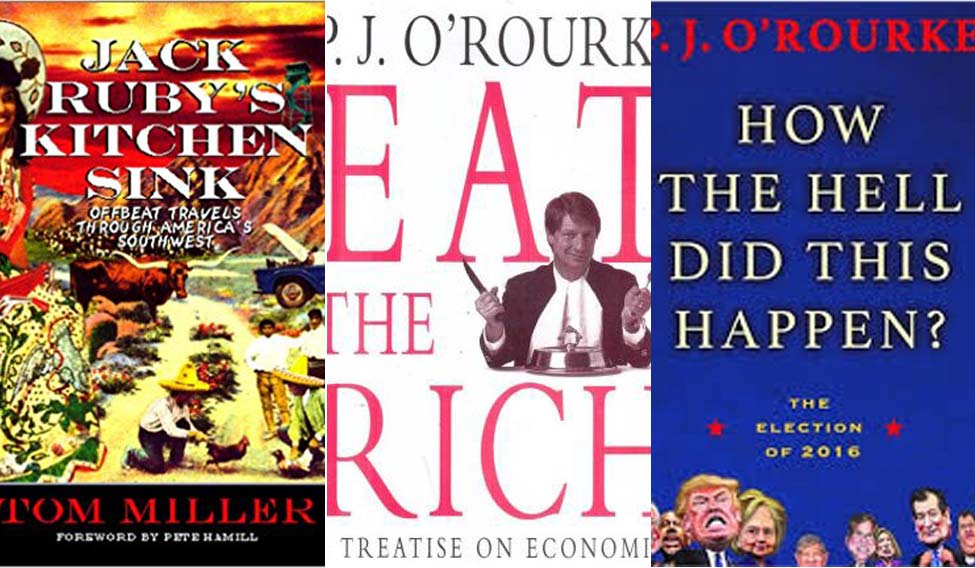"Conquering kings their titles take.." begins a Christian hymn, but what about those of books that demand you take a second look at them for something inviting, intriguing, or even incongruous in their name. While an indirect, rather fanciful title is now the norm, even among them, some have an edge in captivating readers.
Wouldn't you, as a fairly committed bibliophile, take a moment to see what "Midnight in the Garden of Good or Evil" is about, or pick up a book about Americans' fascination with automobiles called Driving Like Crazy: Thirty Years of Vehicular Hell-Bending, Celebrating America the Way It's Supposed to Be - With an Oil Well in Every Backyard, a Cadillac Escalade in Every Carport, and the Chairman of the Federal Reserve Mowing Our Lawn over other more incisive but innocuous-sounding options?
Welcome to the entrancing world of the strangely-named books, where the titles, more or less, do turn out to flag rather interesting reads with the waggish wit of the writer evident right on the cover.
And this is not a modern phenomenon. There was a time where titles usually told what you could expect from the book. An early 15th century account of a Spanish nobleman's embassy to Timur was published as Embajada a Tamorlan in 1582 and translated and published in English in 1859 as Narrative of the Embassy of Ruy Gonzalez de Clavijo to the Court of Timour at Samarcand AD 1403-6. No ambiguity there.
But there were exceptions too. In the early 16th century, English traveller Thomas Coryat, who was considered eccentric and a bit of a buffoon, titled his account of his journey through Europe: Coryat's Crudities hastily gobbled up in Five Months Travels. Don't dismiss it - its effects included introducing the fork to his native land and popularising the tale of William Tell and his superlative archery skills.
The exhaustive naming trend ruled in fiction too. What we now just call Robinson Crusoe had a long title which already told you who he was and what happened to him. But even here, some liked to play about with this. German fantasy and horror author E.T.A. Hoffman who named his complex satire: "The Life and Opinions of the Tomcat Murr together with a fragmentary Biography of Kapellmeister Johannes Kreisler on Random Sheets of Waste Paper" (It sounds more awesomely bombastic in the original German). And it does live up to the title, with a critic contending that if it was published today anonymously, it would become a post modern fiction hit.
But it is our age that this tendency has come into greater vogue. Let us see some illustrious examples, across some popular genres, both fiction and non-fiction.
Virtually anything by veteran American conservative political satirist P.J. O'Rourke could fall into this category. Apart from that tome about Americans' love affair with large cars cited above, you could pick up his "Eat the Rich: A Treatise on Economics", The Baby Boom: How It Got That Way (And It Wasn't My Fault) (And I'll Never Do It Again) and his take on Donald Trump's triumph: How the Hell Did This Happen? The Election of 2016.
In travel, you could not do better than Tom Miller's Jack Ruby's Kitchen Sink: Offbeat Travels Through America's Southwest or J. Maarten Troost's The Sex Life of Cannibals: Adrift in the Equatorial Pacific. But the champion, in both name, place and treatment, is John Gimlette's At the Tomb of the Inflatable Pig: Travels through Paraguay, which is a unique guide to the history, politics and geography of this unique South American country of jungles, dictators, criminals, utopian dreamers and Nazis.
John Berendt's Midnight in the Garden..., cited above, reads like fiction but is actually a non-fiction account of a murder in the 1980s in Savannah city in the US state of Georgia and the trial (s) of a prime suspect, with a crew of eccentric and unusual characters described in detail.
Imaginative and innovative titles may seem evident in fiction but there are some paragons of excellence who may still surprise you.
British comic fantasy author Robert Rankin, who describes his mix of science fiction, fantasy, occult, urban legends, and over the top characters as "far-fetched fiction", has books named The Dance of the Voodoo Handbag and The Hollow Chocolate Bunnies of the Apocalypse among others. In the related science fiction field, there are iconic writer Philip K Dick's dystopian novels Do Androids Dream of Electric Sheep? (adapted into film Blade Runner) and Flow My Tears, the Policeman Said.
For those who may like some more cerebral reading, there is acclaimed Japanese novelist Haruki Murakami with Hard-Boiled Wonderland and the End of the World" "outh of the Border, West of the Sun and Sputnik Sweetheart.
Do you keep an eye on this aspect of books? If so, what are the titles that caught your imagination?
-IANS
BOOKS
A look at strangely-named books and their contents

This browser settings will not support to add bookmarks programmatically. Please press Ctrl+D or change settings to bookmark this page.
THE WEEK
Select your subscription
Please select subscription.
Select payment method
Please select payment method.
Confirm your subscription
Recharge E-Wallet
Enter recharge amount:
Topics :
#lifestyle
| #books







